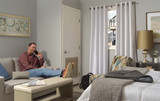Technology and consumer demands constantly evolve, so it can be challenging to keep up with the latest news and updates in the HVAC industry — especially in hospitality management.
As we keep our eyes on the future, we want to highlight some of the most influential trends we’re seeing and what they could mean for your business.
Renewed Interest in Indoor Air Quality
Since the start of the COVID-19 pandemic, there has been increased interest in and focus on cleaner indoor air, especially in hotel rooms and other spaces where new guests move through daily. Manufacturers continue to design new technology for air-conditioning units that target airborne bacteria and viruses while cycling fresh, makeup air.
While there are different ways to do this, such as specialized rooftop systems, packaged terminal air conditioner, or PTAC, systems are the most cost-effective route for the hospitality industry. While normal PTAC models recycle air already in the room, the industry is focused on specific units that not only introduce outside air but also add an extra layer of virus-fighting protection to drastically improve the air quality in the room.
Indoor air quality technology uses UVC lighting that eliminates bacteria in the air, focusing ultraviolet light on the air as it passes through the channel. Results from Environmental Protection Agency testing show this process is 94% effective in reducing the viral concentration of a room in three hours. While helpful for hotels and multifamily dwellings, it is also an important asset for assisted living facilities that use PTAC systems to help protect residents with already-compromised immune systems.
Increased Focus on Product Quality, Savings and Noise
As property managers and hotel owners look to purchase HVAC units, there are three key areas they’ll be focused on: cost-effectiveness, reliability and noise reduction.
Cost-Effectiveness
The immediate concern will be on the initial cost of the units and installation. With labor shortages and inflation, these short-term considerations will be top of mind. In the long term, more focus will be placed on the energy efficiency of units over time. Especially in the hospitality industry, property owners are considering how much these units will save them in the long run.
Reliability
To keep their hotels at maximum occupancy, owners are looking for more and more reliable products that will lessen their need for maintenance, since some problems put rooms out of commission until they are fixed. There is an increasing measure of quality that owners depend on to keep their rooms up and running and maintain a consistent revenue stream.
Noise Reduction
When it comes to noise, hotel owners are concerned with preventing outside noises from coming in, while ensuring operating noises are minimal. They are looking for PTAC systems that provide an adequate barrier to external noises, such as highway traffic or sounds from the surrounding area. Vertical terminal air conditioner, or VTAC, systems — which are internally housed — completely eliminate this risk.
It’s important for guest satisfaction that the inside operating noise is minimal and nonoffensive. While most systems will create a certain level of noise when they’re running, this noise often acts as a white noise that may be welcomed by guests as they sleep or to cover other sounds from adjacent rooms. When sounds become more abrasive — such as unnecessary clicking, popping and buzzing — they negatively affect the guest experience.
This is a driving force behind GE Appliances Air & Water’s dedication to designing PTAC and VTAC units that lead the industry in overall quiet and sound quality.
Automation Will Become More Common
Like most industries, hotels are struggling to hire enough people to operate in the same capacity as before the pandemic. Many properties are looking to technology and automation to solve these issues, such as implementing online check-in/checkout. These advancements have come a long way: Technology is now capable of accomplishing tasks that the staff used to do, assisting with day-to-day operations without creating inconveniences for guests. We’ve barely scratched the surface of what technology can provide hotel property managers.
For years, GE Appliances has utilized smart technology in home appliances, and we’re adapting that same technology to our commercial markets. Our SmartHQ wireless system already offers the most advanced smart appliances designed to make lives easier, provide peace of mind and enhance performance. Transitioning this same idea to hotel facilities will help managers run their properties more efficiently.
- This smart technology can alert owners and staff to a maintenance or operation issue immediately, helping them keep rooms in operation with minimal downtime.
- It can also be used by hotels to allow guests to automatically set their room temperature from their phones before check-in, upgrading the level of service they provide.
- From an energy-efficiency standpoint, when the hotel isn’t at full capacity, managers can control the temperatures of unoccupied rooms to keep them from unnecessarily running, all from a single device.
All of these features not only help hotels operate more efficiently but also improve the guest experience while saving money.
Many of these trends in HVAC can already be found in GE Appliances, such as the Zoneline® UltimateV10™ and the newly released UltimateV12™. See how these easy-to-install, energy-efficient and easy-to-maintain units can help your property now and in the future.

